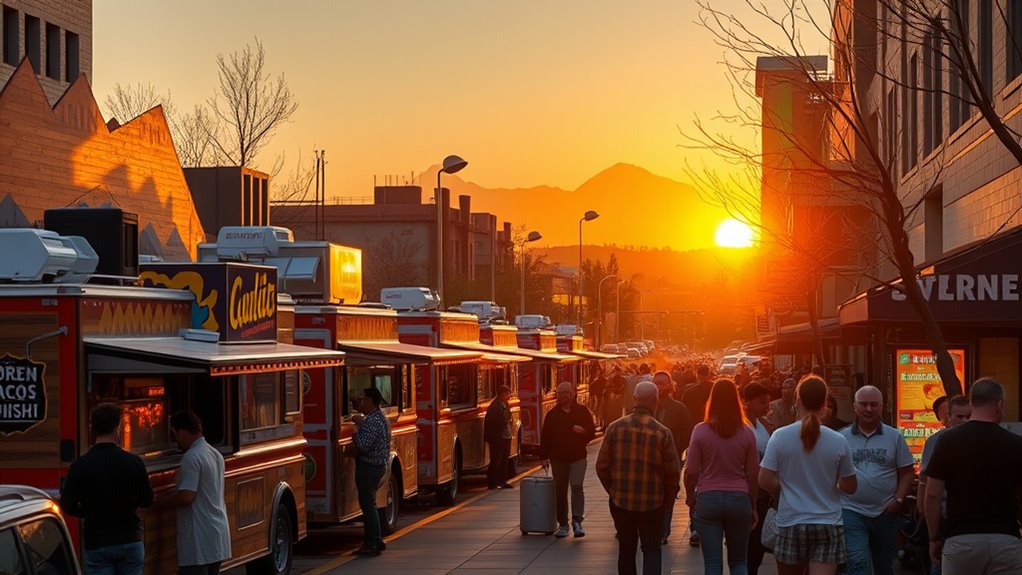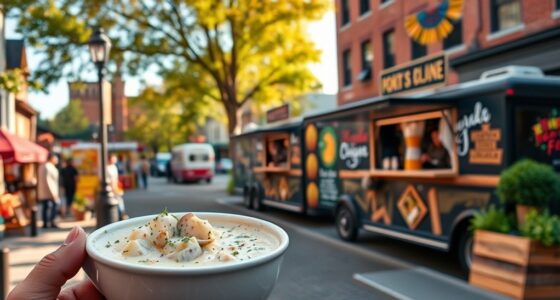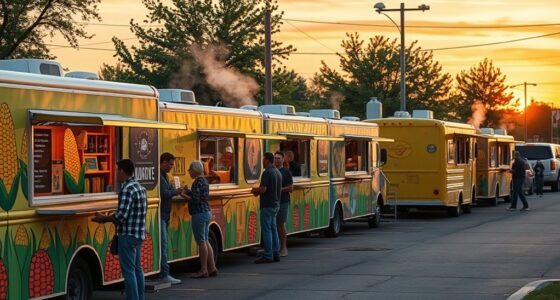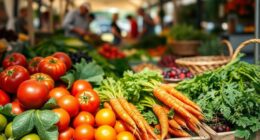Discover Denver’s vibrant Rocky Mountain fusion food truck scene, where regional ingredients like bison, green chiles, and foraged herbs blend with global flavors to create unique, colorful dishes. These trucks highlight local sourcing, sustainable practices, and diverse culinary influences, offering everything from spicy green chile burgers to wild game tacos. To explore how these innovative foods shape Denver’s culinary landscape and what makes them stand out, keep exploring further.
Key Takeaways
- Denver’s food trucks showcase Rocky Mountain fusion by blending regional ingredients like bison, elk, and green chiles with global flavors.
- Signature dishes often feature locally sourced meats, foraged ingredients, and vibrant visual contrasts reflecting regional and multicultural influences.
- Events like street festivals and brewery district gatherings serve as popular venues for exploring these innovative fusion cuisines.
- Chefs emphasize sustainable sourcing and creative combinations, integrating mountain herbs, artisanal dairy, and craft beers into their menus.
- The fusion food truck scene emphasizes community engagement, diversity, and evolving trends like customization and eco-friendly practices.
The Origins of Rocky Mountain Fusion Cuisine in Denver
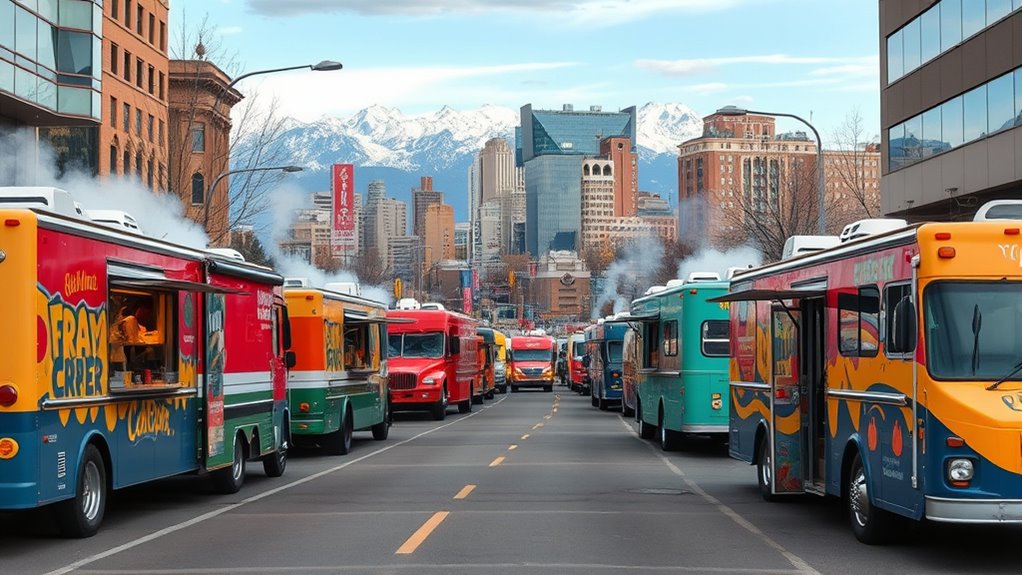
Have you ever wondered how Denver’s unique culinary scene emerged from its frontier roots? It all started in the mid-1800s during the gold rush era, when the city’s food culture was shaped by mining and frontier life. With limited infrastructure, locals relied on breweries and meat processing that suited Western tastes. Segregated ethnic communities, like African American, Eastern European Jewish, and Chinese groups, brought their own culinary traditions, adding diversity. Traditional Denver foods included hearty Western staples like buffalo, trout, steak, and regional specialties such as Rocky Mountain oysters. This early identity focused on meat-heavy dishes, blending practicality with flavor. Over time, these roots laid the foundation for a fusion cuisine that combines rugged frontier ingredients with multicultural influences, evolving Denver’s vibrant culinary landscape. This history helps explain the city’s love for adventurous and diverse foods today, influenced by the cultural melting pot of its early settlers and immigrants.
Notable Food Trucks Pioneering the Movement
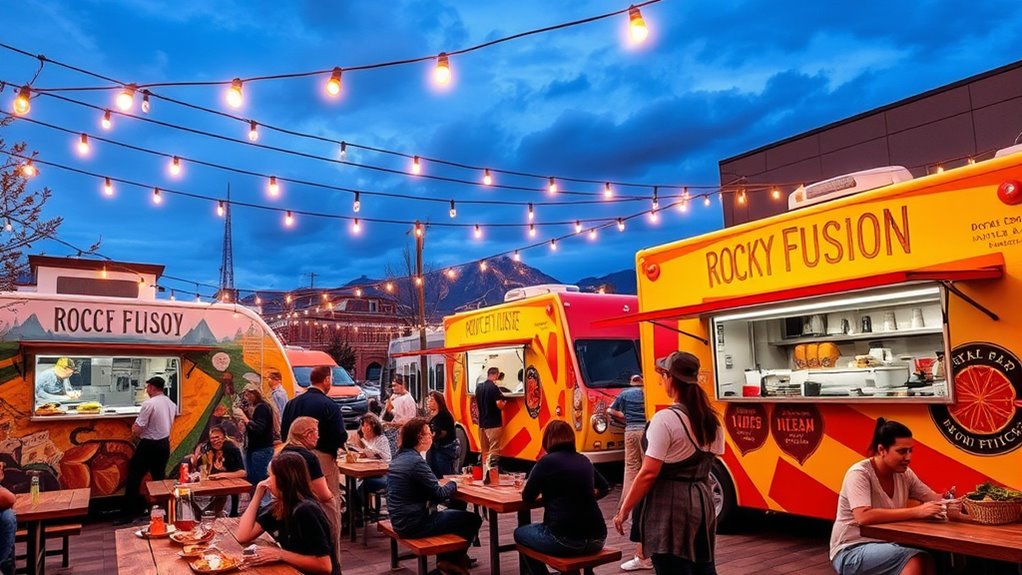
Denver’s vibrant food truck scene is home to several pioneers who are redefining fusion cuisine by blending Rocky Mountain ingredients with global flavors. These trucks showcase innovation with locally sourced proteins like elk sausage and bison, infusing traditional dishes with regional twists. They embrace farm-to-table principles, using fresh mushrooms and wild greens native to the Rockies. Signature dishes often incorporate green chiles, a regional staple, creating authentic yet inventive flavors. Many of these trucks are family-run, blending heritage recipes with local ingredients to honor Denver’s culinary culture. Their creativity has earned recognition, such as Colorado Pig Rig’s People’s Choice Award and The Burger Bus’s popularity since 2017. These pioneers set the tone for Denver’s dynamic fusion movement, inspiring others to experiment and celebrate regional flavors.
Denver’s food trucks blend Rocky Mountain ingredients with global flavors, inspiring innovative regional fusion cuisine.
- Emphasis on local ingredients like elk, bison, and wild greens
- Incorporation of regional staples such as green chili
- Fusion of heritage recipes with modern culinary techniques
- Recognition through awards and community support
- Pioneering innovation that influences Denver’s culinary identity
- Their innovative use of regional ingredients exemplifies the growing trend of authentic fusion cuisine in Denver.
Key Ingredients Defining Rocky Mountain Flavors

The vibrant fusion cuisine of Denver food trucks hinges on a diverse array of key ingredients that embody the rugged and rich flavors of the Rocky Mountains. Wild and game meats like bison, elk, and venison form the heart of many dishes, offering deep, natural flavors rooted in ranching heritage. Locally foraged ingredients such as morels, wild sweet anise, and ramps add earthy, floral, and pungent notes, elevating the cuisine’s freshness. Native vegetables like Pueblo green chiles and heirloom tomatoes bring bold spice and bright acidity, while mountain-grown herbs enhance flavor complexity. Artisanal dairy products, including local ricotta and cultured yogurts, lend creaminess and tang. Additionally, craft beers brewed with mountain hops infuse dishes with bitterness and floral nuances, tying the flavors to the region’s terroir. Textile Line offers insight into protective styling techniques that can preserve the freshness and integrity of these regional ingredients when preparing dishes.
Popular Fusion Dishes and Culinary Styles
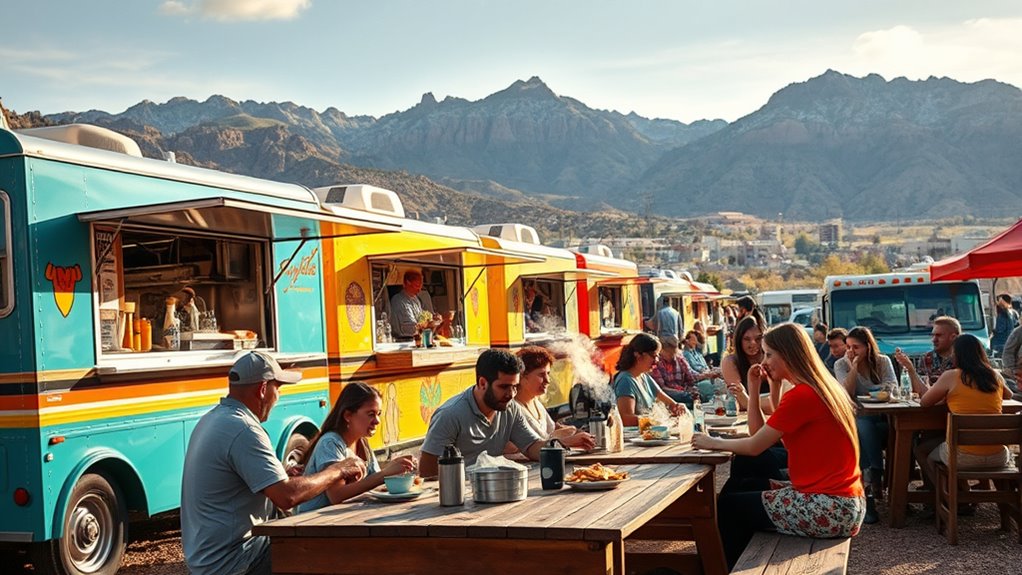
Fusion dishes in Denver food trucks showcase a vibrant mix of regional ingredients and global flavors, creating innovative culinary experiences. You’ll find bison steaks reimagined with international spices, and Rocky Mountain Oysters boldly featured in adventurous menus. Colorado green chile appears in burritos, burgers, and fries, emphasizing local pride. Venison and elk are incorporated into tacos and sliders, blending Western game with global seasonings. Trout from mountain streams is paired with Asian sauces or Southwestern spices, highlighting local freshness with international flair. Contrast ratio plays a key role in how these diverse flavors and ingredients are visually presented, ensuring vibrant and appetizing dishes.
Prime Locations and Events Showcasing Rocky Mountain Fusion
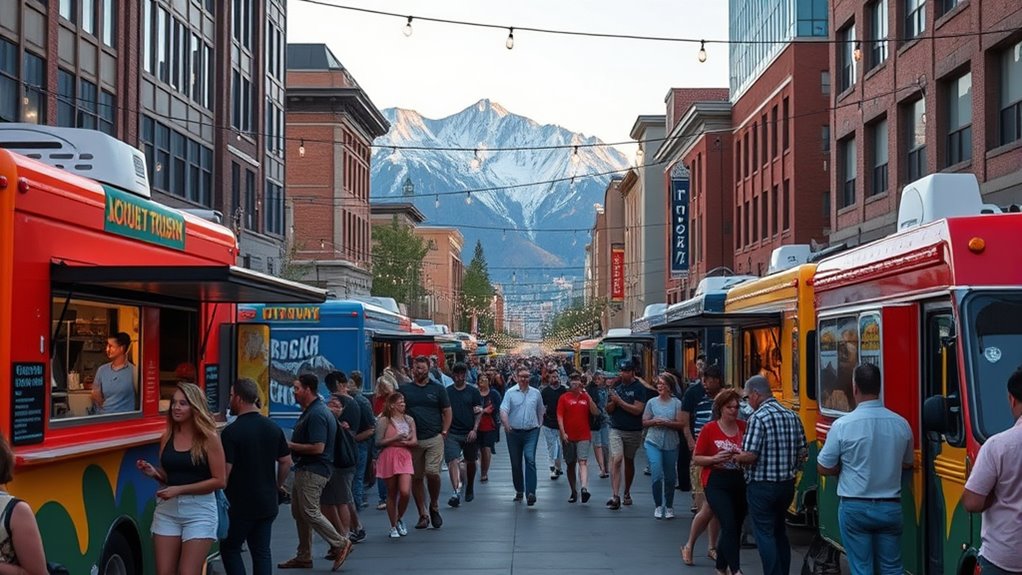
You’ll find Rocky Mountain fusion at Denver’s lively street festivals and bustling brewery districts, where food trucks set up shop regularly. These locations attract diverse crowds enthusiastic to sample innovative dishes paired with local craft beers. Attending these events and visiting these hubs gives you a firsthand look at how fusion cuisine thrives in Denver’s vibrant food scene. Rocky Mountain Slices is a prime example of a food truck bringing this fusion experience directly to the community.
Denver Street Festivals
Ever wondered where Denver’s vibrant street scenes showcase the city’s unique Rocky Mountain Fusion cuisine? Major festivals like the 16th Street Summer Kickoff celebrate this blend, running May 31–June 1, 2025, along 16th Street Mall. This event draws crowds with diverse fusion food trucks, live music, family zones, and a beer garden, creating a lively urban atmosphere. Other seasonal markets, like the 16th Street Markets, feature food trucks and musicians, offering ongoing exposure for fusion cuisine enthusiasts. The Denver Chalk Art Festival near Civic Center Park attracts art lovers and foodies alike, with trucks serving creative Rocky Mountain-inspired dishes. These festivals serve as prime platforms to experience Denver’s culinary diversity, blending local ingredients with global influences in a vibrant, community-driven setting. Recognizing the entertainment ideas surrounding these events highlights how community involvement fosters a lively atmosphere and supports emerging fusion chefs and vendors.
Local Brewery Districts
Are you curious about where Denver’s craft beer scene intersects with innovative culinary experiences? The city’s Brewery Districts, especially RiNo, are prime spots to explore Rocky Mountain Fusion. RiNo boasts over 10 breweries within two miles, making walkable brewery hopping easy. These breweries, like Bierstadt Lagerhaus and Ratio Beerworks, blend traditional and experimental methods, often featuring fusion styles that incorporate local ingredients. Events such as seasonal festivals and collaborative releases highlight regional ingredients paired with street foods from food trucks offering diverse fusion menus. Rooftop patios and outdoor fire pits at breweries like Odell create ideal venues for experiencing craft beers alongside fusion bites. This vibrant ecosystem fosters continuous innovation in both brewing and cuisine. Additionally, many breweries utilize electric bike conversion kits to promote eco-friendly transportation for visitors exploring the area.
The Role of Local Sourcing and Sustainability

Local sourcing and sustainability play a vital role in shaping the identity and operations of Rocky Mountain fusion food trucks in Denver. By prioritizing regional ingredients native to Colorado, you connect your menu to local culture and reduce environmental impact. Seasonal menu adjustments allow you to leverage fresh produce, wild game, and native berries, supporting local farmers and reducing transportation emissions. Using sustainable packaging and waste reduction practices further emphasizes your commitment to eco-friendly operations. Collaborating with local farms and cooperatives increases supply chain transparency and trust. Over 600 food truck businesses operate in Denver, many relying on local ingredients. You support Colorado’s economy and farmers, strengthening community ties. Incorporating market research helps identify the most desired seasonal ingredients and customer preferences, ensuring your menu remains relevant and appealing. Seasonal ingredients ensure freshness and flavor authenticity. Eco-friendly practices reduce your carbon footprint. Local sourcing fosters menu innovation and uniqueness. Building local relationships enhances sustainability and resilience.
Consumer Preferences and Market Trends
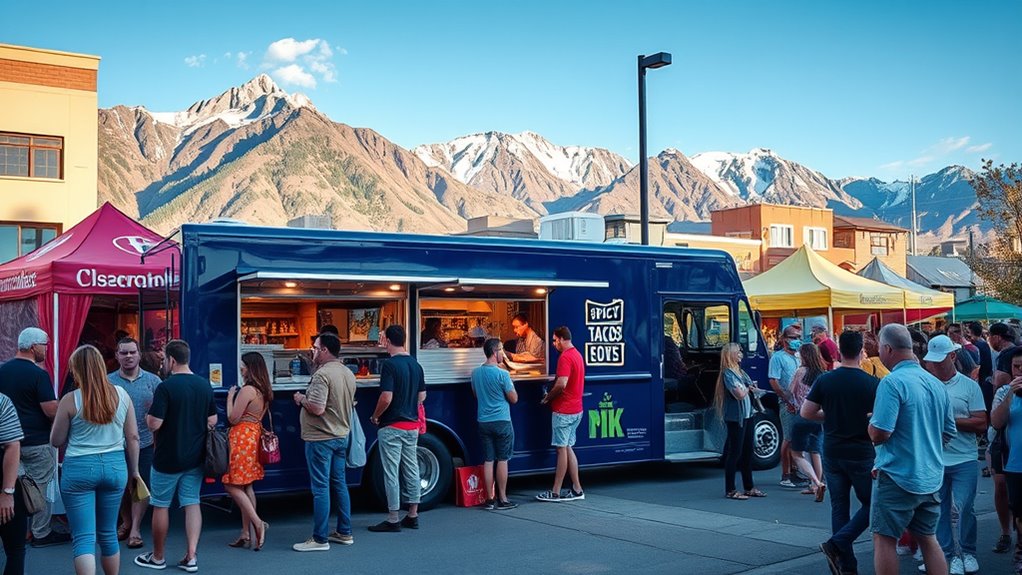
You’ll notice that consumers are increasingly drawn to local, healthier, and culturally diverse options when choosing food trucks. They want innovative fusion dishes that reflect current market trends and cater to health-conscious preferences. As these preferences grow, food trucks in Denver are adapting their menus to meet the demand for fresh, culturally inspired cuisine. Recognized as the 2nd-most food-truck friendly city in the U.S. by Food Truck Nation report (March 2018), Denver’s vibrant scene encourages vendors to experiment with diverse flavors and healthier ingredients to attract a broader customer base. Additionally, the desire for active listening and empathy in customer interactions influences how vendors tailor their offerings to meet evolving cultural tastes.
Growing Local Food Demand
Consumer preferences in Denver are driving a surge in demand for affordable gourmet food, with more people seeking creative, high-quality meals at accessible prices. Food trucks offer an attractive solution by providing quick service with innovative menus, often at lower prices than traditional restaurants. The market’s growth reflects a shift toward convenience, neighborhood accessibility, and diverse culinary options. You’ll notice a strong appetite for fusion cuisines and experimentation with flavors, as customers want unique dining experiences. This trend encourages food trucks to stand out with innovative offerings that reflect global influences. The city’s regulatory environment also supports growth, making entry easier for entrepreneurs. Overall, Denver’s food scene is evolving into a vibrant mix of quality, variety, and community engagement, fueling the rising local food demand. Additionally, the emphasis on diverse, global-inspired menus highlights the importance of cultural fusion in attracting a broad customer base.
Healthier Dietary Options
As Denver’s vibrant food truck scene continues to grow, so does the demand for healthier dietary options. You’ll notice trucks like Crock Spot Gourmet, Bowls by KO, and Sunshine Bowls emphasizing nutrient-dense menus packed with vegetables and plant proteins. Plant-based dishes, such as Vital Root’s “99 percent vegan” offerings, resonate strongly with health-conscious consumers. Gluten-free, allergen-sensitive choices from Legacy Pie Co. and others are increasingly common, catering to diverse dietary needs. Many trucks now serve flavorful bowls and wraps that balance taste and wellness, often incorporating ethnic fusion to keep things exciting. These trends reflect a clear shift toward fresh ingredients, portion control, and inclusive options, making healthy eating both accessible and appealing on Denver’s streets. Utilization of data analytics further supports targeted menu development by identifying consumer preferences.
Cultural Fusion Appreciation
Cultural fusion has become a defining feature of Denver’s thriving food truck scene, driven by diverse ownership and evolving consumer tastes. You’ll notice a strong preference among 25–44-year-olds for fusion dishes that blend global flavors with local ingredients. Immigrant operators, making up 38% of owners, bring authentic influences that inspire creative combinations. Women entrepreneurs, representing 30%, contribute to greater diversity and innovation. As urban and suburban areas grow, more people seek quick, ethnic-inspired meals, especially with remote work changing dining habits. Millennials and Gen Z crave social media-friendly, unique menus that stand out. This trend reflects a broader shift toward appreciating authentic, customizable, and innovative food experiences on the move.
- Diverse ownership fuels authentic culinary influences
- Younger consumers prioritize social media appeal
- Urban density drives ethnic cuisine demand
- Female entrepreneurs boost innovation
- Remote work increases off-site dining options
How Fusion Food Trucks Enhance Denver’s Food Scene
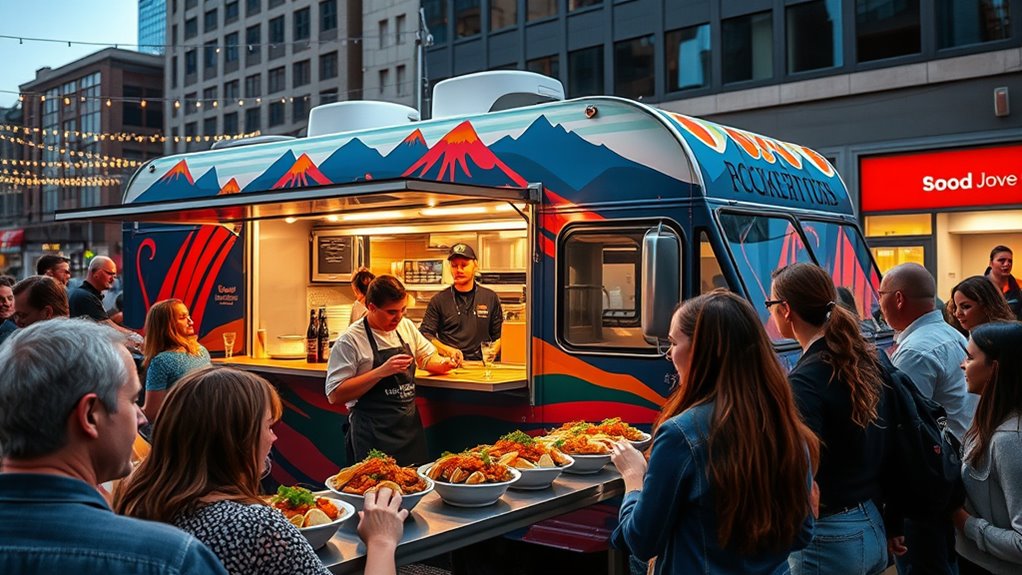
Fusion food trucks markedly boost Denver’s culinary landscape by offering innovative, diverse flavors that appeal to a wide range of diners. They introduce creative combinations of regional Rocky Mountain ingredients with international cuisines, elevating the local food scene. With over 600 trucks operating in Denver, these mobile eateries foster culinary experimentation and attract adventurous eaters. Fusion trucks like Yuan Wonton showcase high-quality, award-nominated dishes, proving that mobile dining can deliver gourmet experiences. They also increase food accessibility by serving high-traffic areas and underserved neighborhoods, making diverse options available outdoors and on the go. Additionally, their flexibility allows for quick menu adaptation based on customer feedback, fueling ongoing innovation. Page results update daily, reflecting current trends and the most liked trucks in the city. Overall, fusion food trucks enrich Denver’s vibrant, dynamic food culture and inspire new culinary trends.
Future Directions for Rocky Mountain Fusion in Denver
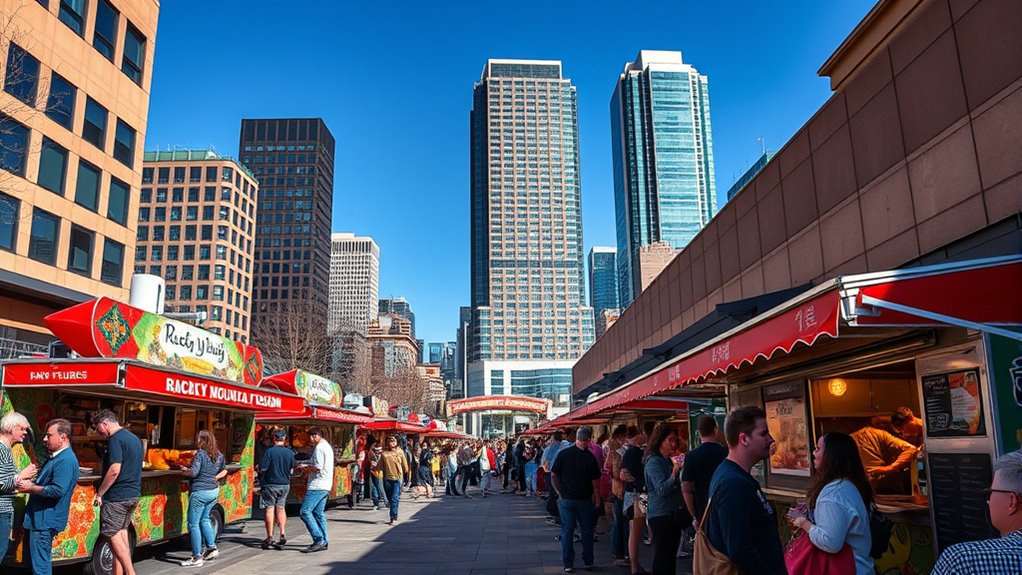
Looking ahead, Denver’s fusion food truck scene is poised for significant evolution through the incorporation of local ingredients and international flavors. You’ll see more dishes blending Rocky Mountain staples like bison and trout with Mexican and Korean influences, reflecting the 63% of residents craving diverse culinary experiences. Menus will likely feature protein-rich, spicy options that align with future consumer trends. Chefs will continue using Colorado’s fresh, local produce to craft innovative fusion dishes that honor regional heritage while appealing to modern tastes. Technology will play a bigger role, offering customizable orders, digital menus, and real-time data analytics to enhance convenience and personalization. Fusion trucks will expand into new venues, partner with local events, and promote inclusivity by highlighting diverse cultural voices.
- Emphasis on local ingredients and international flavor combinations
- Increased use of technology for customization and efficiency
- Expansion into non-traditional venues and events
- Focus on sustainability with eco-friendly packaging
- Greater representation of diverse culinary voices
Frequently Asked Questions
How Do Food Trucks Incorporate Local Colorado Ingredients Into Fusion Dishes?
You can incorporate local Colorado ingredients into fusion dishes by using fresh regional produce, wild game, and sustainable meats. Incorporate ingredients like arugula, mushrooms, and seasonal vegetables, blending them with ethnic flavors. Use locally sourced cheeses and herbs, and adapt traditional recipes with Colorado’s wild meats and produce. This approach highlights regional flavors, supports local farmers, and creates unique, authentic dishes that resonate with adventurous customers seeking Colorado’s culinary identity.
What Are Some Lesser-Known Rocky Mountain Ingredients Used in Fusion Cuisine?
You might not realize it, but lesser-known Rocky Mountain ingredients bring vibrant life to fusion cuisine. Imagine biting into tender young cattail shoots or drizzling a sauce made from bright golden currants, their tartness dancing on your tongue. Wild edible plants like yarrow and fuzzy yarrow leaves infuse teas with herbal complexity. These native ingredients add depth, color, and a touch of wilderness magic to every dish, elevating your culinary experience.
How Do Fusion Food Trucks Adapt to Changing Dietary Trends Like Veganism?
You adapt to changing dietary trends like veganism by redesigning your menu to include plant-based comfort foods that appeal to a broad audience. Incorporate seasonal, locally grown produce, experiment with new ingredient combinations, and collaborate with professional chefs for quality. You also balance vegan options with omnivore-friendly dishes, ensuring your truck attracts diverse customers. Staying updated on trends and sourcing sustainable ingredients helps you remain relevant and successful in Denver’s evolving food scene.
Are There Seasonal Variations in Rocky Mountain Fusion Menus?
You’ll notice seasonal variations in Rocky Mountain fusion menus, like a food truck featuring bison and wild mushroom dishes in fall and winter. For example, during summer, they might serve lighter salads with fresh berries or herbs. These changes reflect local ingredient availability and weather, helping trucks stay relevant and appealing year-round. By adapting menus to seasonal flavors and festivals, you experience authentic, regionally inspired dishes that celebrate Colorado’s natural bounty.
How Do Food Trucks Source Sustainable and Locally Farmed Ingredients?
You can see that food trucks source sustainable and locally farmed ingredients by partnering directly with nearby farms and producers. They prioritize Colorado-grown products like grass-fed beef and lamb, and use seasonal surplus produce to minimize waste. Transparent about their sourcing, they support ethical farms and use whole ingredients in zero-waste cooking. This approach guarantees fresh, regional flavors while promoting environmental responsibility and community sustainability.
Conclusion
You’ll be amazed to learn that over 60% of Denver’s food trucks now feature Rocky Mountain fusion dishes, blending local flavors with global influences. This vibrant movement isn’t just about tasty eats; it celebrates sustainability and creativity. As more food trucks embrace this style, you’ll find innovative plates at every turn, making Denver a true culinary hotspot. Keep exploring—you’re guaranteed a delicious adventure in every bite!
